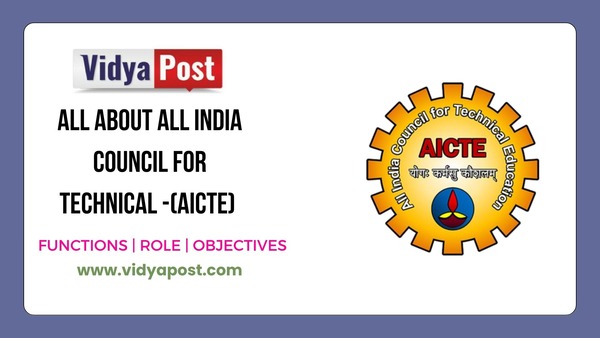All About AICTE

The All India Council for Technical Education (AICTE) is a national-level Apex Advisory Body that was founded in November 1945 to survey the facilities and provisions for technical education in institutes. The council's goal is to promote India's growth in a comprehensive and coordinated manner. It is part of the Department of Higher Education and was given statutory status by an Act of Parliament in 1987. The AICTE is alone in charge of organizing and developing technical education in the nation's educational institutions.
Also, Read All about AIU
History
In the middle of the 19th century, formal technical education first emerged in India. The Governor General's policy statement of 1913 stressing the importance of technical education, the appointment of the Indian Universities Commission in 1902, the release of the Indian Education Policy Resolution in 1904, the Governor General's policy statement in Bengal in 1905, and the establishment of industrial schools across several provinces were all significant policy initiatives during the pre-independence period.
The Central Advisory Board of Education's (CABE) Technical Education Committee was established by the government in 1943.
In 1945, the government established the All India Council for Technical Education based on the Sergeant Report (1944).
The All India Council for Technical Education was founded in November 1945 as a top-level advisory body at the national level to evaluate technical education facilities and promote coordinated and integrated growth in the nation.
The AICTE was granted the following powers under the National Policy of Education (1986):
-
Planning, creating, and maintaining norms and standards under statutory authority
-
Certification for quality control
-
Priority monitoring, assessment, and funding
-
Maintaining parity in certification and awards
-
The administration of technical education in the nation.
Role of AICTE
-
In their role as a statutory authorities, they establish, carry out, and uphold the norms and standards.
-
Planning and Coordinated Development of the Technical Education System for Quality Promotion.
-
Oversee and improve India's technical education system.
-
Provides institutional accreditation as a means of quality control.
-
Provides quality control by accrediting institutions.
-
Recognizes the demand and provides money to the most important locations.
-
Monitor, evaluate, and finance the sectors that need funding the most.
Functions of AICTE in the Indian education system
To fulfill its obligations, the Council is required to use all practical measures to ensure the coordinated and integrated growth of technical and managerial education as well as the maintenance of standards:
- Survey several areas of technical education, gather information on all relevant topics and anticipate the required expansion and improvement.
-
The Council may coordinate the advancement of technical education in the country at all levels.
-
Inform the Commission of any technical institutes that have been designated as deemed universities.
-
Allocate and disburse funds from the Council's Fund on such terms and conditions as it deems appropriate to
(i) technical institutions and
(ii) universities providing technical education in collaboration with the Commission.
-
Take efforts to strengthen present organizations and build new organizations, as well as construct professional, technical, and support personnel positions depending on requirements, to enable the successful performance of the Council's tasks.
-
Encourage a strong connection between the technical education system and other important systems, such as research and development agencies, industry, and the community.
-
Establish standards for granting autonomy to technical institutions.
-
Permit the founding of new technical institutions and the introduction of new programs or courses in cooperation with pertinent organizations.
-
Provide rules for student admission to technical institutions and universities that provide technical education.
-
Promote a close relationship between technical education and other crucial systems, including research and development organizations, businesses, and the community.
Schemes and initiatives
The All India Council for Technical Education (AICTE) has launched numerous programs and projects to advance education across the nation:
(i) Student development schemes
-
Saksham Scholarship for Students with Disabilities
-
SC/ST Prerna Scheme Students preparing for higher education institution
-
Pragati Scheme to honor deserving girls
-
Smariddhi Scheme for SC/ST Students to Assist with Startups
(ii) Faculty development schemes
-
The National Initiative for Technical Teacher Training (NIT)
-
Distinguished Visiting Professorship Scheme
(iii) Institutional Development Schemes
-
AICTE Program to Encourage Students' Interest, Creativity, and Ethics
-
AICTE-IDEA (Idea Development, Evaluation & Application) Lab
-
E- SHODH SINDHU provides free access to e-Journals and e-Resources to AICTE-approved
-
Government and government-aided technical institutes.
(iv) Research & Innovation Development schemes
-
Entrepreneurship Development Cell
-
Collaborative Research Scheme (CRS) to award research funds to young faculty members
(v) General Schemes
-
Rural development through the Saansad Aadarsh Gram Yojana
Conclusion
The AICTE is an important statutory organization in India that oversees the technical education system's planning and development. The work of AICTE and initiatives like Make in India, Skill India, Digital India, etc. could soon transform Indian society into a technologically advanced one. Thus, the All India Council for Technical Education becomes significant.
Also, Read 7 benefits of studying a distance learning degree in 2023
Share:

2 Comments
Jordan Singer
2d2 replies
Santiago Roberts
4d